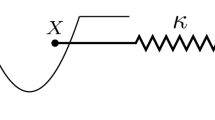Abstract
Solutions are given for the debonding of a strip by extending the usual peel test analysis. Exact solutions are obtained for concentrated loads and for uniform pressure. Consideration is also given to energy based solutions and to the effect of residual strains. The axisymmetric case is then analysed in detail and the exact series solution compared with the constant stress assumption. It is observed that only slight errors arise in using the latter and a general scheme is developed for deriving expressions for G based on this assumptions. Solutions for concentrated forces, island blisters and constrained blisters are derived. The effects of large displacements and of plastic yielding are also described. It is observed that solutions for G in the form of energy divided by area created are very useful in that the parameters relating this ratio to G are reasonably insensitive, thus rendering experiments simple.
Similar content being viewed by others
Explore related subjects
Discover the latest articles, news and stories from top researchers in related subjects.References
Allen, M.G. and Senturia, S.D. (1988). Analysis of critical rebonding pressures of stressed thin films in the blister test. Journal of Adhesion 25, 303–315.
Beams J.W. (1995). In structures and properties of thin films. Edited by C.A. Neugebauer/Wiley, N.Y., 183.
Briscoe, B.J. and Panesar, S.S. (1991). The application of the blister test to an elastomeric adhesive. Proceedings of the Royal Society London A433, 23–43.
Chang, Y.S., Lai, Y.H., and Dillard, D.A. (1989). The constrained blister — a nearly constant strain energy release rate test for adhesives. Journal of Adhesion 27, 197–211.
Cotterell, B. and Chen, Z. (1997). The blister test — Transition from plate to membrane behaviour for an elastic material. International Journal of Fracture 86, 191–198.
Gent, A.N. and Hamed, G.R. (1977). Peel mechanics for an elastic— plastic adherend. Journal of Applied Polymer Science 21, 2817–2831.
Gent, A.N. and Lewandowski, L.H. (1987). Blow-off pressures for adhering layers. Journal Applied Polymer Science 33, 1567–1577.
Hencky, H. (1915). Über den spannungszustand in kreisrunden platten mit verschwindender biegungssteiflgkeit. Zeitschrift fur Mathematik und Physik 63, 311–317.
Hinkley, J.A. (1983). A blister test for adhesion of polymer films to SiO2. Journal of Adhesion 16, 115–126.
Jensen, H.M. (1991). The blister test for interface toughness measurement. Engineering Fracture Mechanics 40(3), 475–486.
Kendall, K. (1971). The adhesion and surface energy of elastic solids. Journal of Physics D: Applied Physics 8 4, 1186–1195.
Wan, K.T. and Mai, Y.W. (1995). Fracture mechanics of a new blister test with stable crack growth. Acta Metallurgica et Materialia 43(11), 4109–4115.
Wan, K.T. and Mai, Y.W. (1995). Fracture mechanics of a shaft-loaded blister of thin flexible membrane on rigid substrate. International Journal of Fracture 74, 181–197.
Williams, J.G. (1993). Root rotation and plastic work effects in the peel test. Journal of Adhesion 41, 225–239.
Williams, J.G. (1993). A review of the determination of energy release rates for strips in tension and bending: Part I — Static Solutions; Part II — Dynamic Solutions. Journal of Strain Analysis 28 4, 237–256.
Williams, J.G. (1980). Stress analysis of polymers, 2nd Ed., Ellis Horwood, Chichester.
Author information
Authors and Affiliations
Rights and permissions
About this article
Cite this article
Williams, J. Energy Release Rates for the Peeling of Flexible Membranes and the Analysis of Blister Tests. International Journal of Fracture 87, 265–288 (1997). https://doi.org/10.1023/A:1007314720152
Issue Date:
DOI: https://doi.org/10.1023/A:1007314720152




